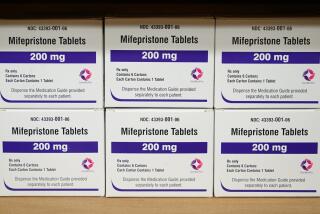There’s a Cure for Frivolous Drug Lawsuits
- Share via
Morning sickness -- the nausea and vomiting that afflicts more than half of all pregnant women -- can be debilitating. There used to be an excellent prescription medication to treat it, but the manufacturer stopped selling the drug in the United States. Safety problems? Unprofitability? Not at all. Frivolous, debilitating lawsuits killed this drug.
During the 1970s and 1980s, nearly 2,000 lawsuits were filed against Merrell Dow Pharmaceuticals, alleging that the company’s drug, Bendectin, had caused birth defects in the offspring of women who took it to prevent morning sickness. Not a single judgment against the company was upheld, but ultimately Merrell Dow discontinued manufacturing Bendectin because of fears that an unreasonable jury might some day award huge damages.
Despite a generally high level of rigor and quality control in the pharmaceutical industry and intense scrutiny by the Food and Drug Administration, drug and medical device companies are tempting targets for product liability litigation. Even when no causal relationship between the product and injury or illness can be demonstrated, or when the alleged injury is a minor side effect listed on the product’s label, companies are at risk.
The most egregious example of damage wrongfully inflicted on a manufacturer is silicone breast implant cases. Since the first case went to trial in the 1980s, hundreds of thousands of women have filed claims in state courts or through a federal class-action settlement. The vast majority of the verdicts have favored the defendants, based primarily on medical evidence that shows silicone breast implants are not dangerous.
But what has befallen Dow Corning and other manufacturers of breast implants is corporate America’s worst nightmare: virtual annihilation through civil lawsuits, in the absence of evidence of wrongdoing or product defects, or any association between the product and severe illness. After more than 20,000 breast implant-related lawsuits, Dow Corning had to file for bankruptcy protection.
Experts estimate that our tort system costs Americans $180 billion annually in higher costs for purchases as diverse as Little League baseball bats and automobiles. That’s more than $1,500 per household annually in increased product costs.
This is not an efficient way to prevent dangerous products from being sold. The threat of liability suits makes businesses wary, but it also shifts their focus from whether the product actually is safe to how vulnerable the product is to claims for damages. The prospect of baseless litigation is also a major disincentive for a company to work on new medical technologies.
The protection of consumers from shoddy products is important, but where pharmaceuticals (and similar products such as pesticides) are concerned, most liability suits are redundant: Rigorous federal regulation already protects the public.
This redundancy argues for a “regulatory compliance defense” against allegations of product liability. In other words, a pharmaceutical manufacturer’s liability would be mitigated by regulators’ extensive control over every phase of development -- including clinical research, pre-marketing evaluation, post-marketing surveillance and the preparation of labeling and advertising materials. If a manufacturer meets the stringent and comprehensive regulatory requirements for product approval, and makes the product in the prescribed way, any mishap from the product would be considered to be nonculpable. Such a defense would apply to damages caused by unforeseen circumstances, but it would not extend to fraud or negligence.
The existing system for attributing product liability is a drag on national competitiveness and innovation and is detrimental to public health. This state of affairs is nauseating. If only I had some Bendectin.
*
Physician Henry I. Miller, a former FDA official, is a fellow at the Hoover Institution and Competitive Enterprise Institute.
More to Read
Inside the business of entertainment
The Wide Shot brings you news, analysis and insights on everything from streaming wars to production — and what it all means for the future.
You may occasionally receive promotional content from the Los Angeles Times.










